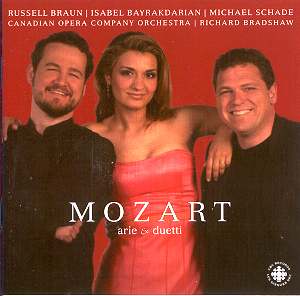Three leading Canadian
opera singers get together to make a
disc of favourite arias and duets by
Mozart, the man of the year.
The choice of repertoire
is more or less predictable. There are
no lesser known arias, and Gott sei
Dank they have been grouped by opera
but, within the operas, not in the order
of appearance. The ordering of the operas
seems haphazard, too. "What an
ungrateful nit-picker!" I can hear
readers mumble. "Of course they
have decided the order to achieve as
much variety as possible". But
I am not so sure. Why, in that case,
start the recital, after the Zauberflöte
overture with two arias in a row sung
by Russell Braun? Why have a duet from
Così with Schade followed
by two tenor arias? I can do
my own programming, so why bother? But
programming is essential to get a good
rhythm or to be instructive, for instance
following a composer’s development,
so it shouldn’t be over-looked. End
of carping.
Of the three singers
I was pleased to find Russell Braun
among them. I heard him as Valentin
in Faust in Paris a few years
ago and liked him very much. His voice
is light and lyrical, a high baritone.
Maybe he shouldn’t sing Figaro, who
should have more weight, more darkness,
but he still gives a fine reading of
Non più andrai, boisterous
and mocking. All through the disc his
is a very lively presence and since
he has the lion’s share of the music
he so to speak sets the seal on the
performances. His Papageno is light
and natural, the champagne aria from
Don Giovanni is elegant and aristocratic
and the beginning of the duet La
ci darem la mano, which is preceded
by a few lines of recitative to set
the scene, is so seductively delivered
that more experienced girls than Zerlina
would follow him straightaway. He characterises
well in the Così aria,
which is the least well-known piece
here and he is properly upset as Count
Almaviva without hectoring.
Michael Schade, whom
I
had reason to praise for his neurotic
Tito on the Harnoncourt Clemenza
di Tito (DVD) a while ago, is soft
and intense by turns. His soft side
can approach "crooning" but
is skilfully done and his uppermost
register can be a bit penetrating in
tone when he sings forte. In
general though he is also very good
and the Entführung aria
is especially fine.
I have read some glowing
reviews of Armenian-born Isabel Bayrakdarian
of late but had so far never heard her.
I must say that she more than lived
up to her reputation. Not only is she
the possessor of one of the most beautiful
soprano voices around with splendid
technique and stylishness, she also
seems to be an actress who can create
believable characters. Pamina and Zerlina
are two innocent young women but they
should be quite unlike each other. And
they are. Pamina, being the daughter
of the Queen of the Night has a certain
aristocratic bearing, while the peasant
girl Zerlina, in the duet with Don Giovanni,
is full of rustic charm and amazement
at being courted by a nobleman. When
she then changes dress to the wronged
and revengeful Donna Elvira she also
changes voice and is all of a sudden
an outraged and sad woman. As Fiordiligi
she is so creamy-toned that even Kiri
Te Kanawa and Renée Fleming have
to watch out. She is the most lovely
of Susannas in the Rosenarie,
as it is known in Germany. When will
some company sign her up for a complete
recording?
Richard Bradshaw secures
good playing from his orchestra, embracing
the idea that accompaniments should
be discreet. The sound is good and the
booklet has bios in English and French.
The sung texts are preceded by short
but illuminating notes that place the
arias in context.
Most Mozartians will
already be well-stocked with these arias
in favourite versions but for the opportunity
to hear this sensational new soprano
and two very good male colleagues this
is a safe recommendation.
Göran Forsling


